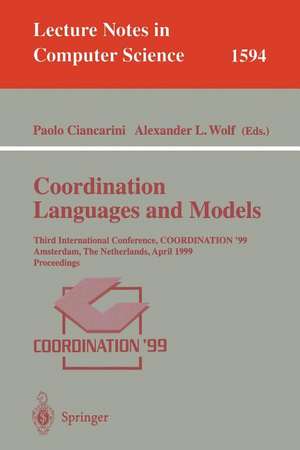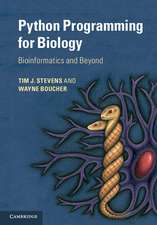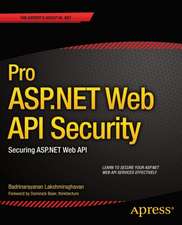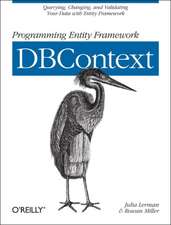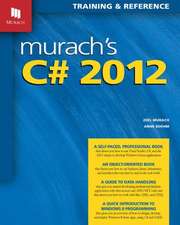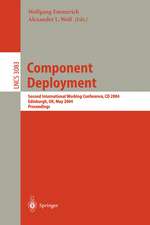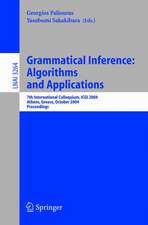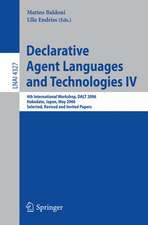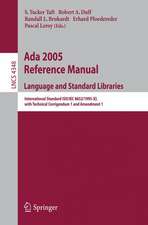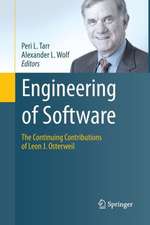Coordination Languages and Models: Third International Conference, COORDINATION'99, Amsterdam, The Netherlands, April 26-28, 1999, Proceedings: Lecture Notes in Computer Science, cartea 1594
Editat de Paolo Ciancarini, Alexander L. Wolfen Limba Engleză Paperback – 14 apr 1999
Din seria Lecture Notes in Computer Science
- 20%
 Preț: 1061.55 lei
Preț: 1061.55 lei - 20%
 Preț: 307.71 lei
Preț: 307.71 lei - 20%
 Preț: 438.69 lei
Preț: 438.69 lei - 20%
 Preț: 579.30 lei
Preț: 579.30 lei -
 Preț: 410.88 lei
Preț: 410.88 lei - 17%
 Preț: 427.22 lei
Preț: 427.22 lei - 20%
 Preț: 596.46 lei
Preț: 596.46 lei - 15%
 Preț: 448.04 lei
Preț: 448.04 lei - 20%
 Preț: 353.50 lei
Preț: 353.50 lei -
 Preț: 389.49 lei
Preț: 389.49 lei - 20%
 Preț: 309.90 lei
Preț: 309.90 lei - 20%
 Preț: 645.28 lei
Preț: 645.28 lei - 20%
 Preț: 763.23 lei
Preț: 763.23 lei - 15%
 Preț: 580.46 lei
Preț: 580.46 lei - 20%
 Preț: 310.28 lei
Preț: 310.28 lei - 20%
 Preț: 655.02 lei
Preț: 655.02 lei - 20%
 Preț: 1183.14 lei
Preț: 1183.14 lei - 20%
 Preț: 340.32 lei
Preț: 340.32 lei -
 Preț: 449.57 lei
Preț: 449.57 lei - 20%
 Preț: 591.51 lei
Preț: 591.51 lei - 18%
 Preț: 938.83 lei
Preț: 938.83 lei - 20%
 Preț: 337.00 lei
Preț: 337.00 lei - 20%
 Preț: 649.50 lei
Preț: 649.50 lei - 20%
 Preț: 607.40 lei
Preț: 607.40 lei - 20%
 Preț: 1414.79 lei
Preț: 1414.79 lei - 20%
 Preț: 1024.44 lei
Preț: 1024.44 lei - 20%
 Preț: 583.40 lei
Preț: 583.40 lei - 20%
 Preț: 453.32 lei
Preț: 453.32 lei - 20%
 Preț: 575.49 lei
Preț: 575.49 lei - 20%
 Preț: 1075.26 lei
Preț: 1075.26 lei - 20%
 Preț: 585.88 lei
Preț: 585.88 lei - 20%
 Preț: 825.93 lei
Preț: 825.93 lei - 17%
 Preț: 360.20 lei
Preț: 360.20 lei - 20%
 Preț: 763.23 lei
Preț: 763.23 lei - 20%
 Preț: 340.32 lei
Preț: 340.32 lei - 20%
 Preț: 504.58 lei
Preț: 504.58 lei - 20%
 Preț: 369.13 lei
Preț: 369.13 lei - 20%
 Preț: 580.93 lei
Preț: 580.93 lei - 20%
 Preț: 343.62 lei
Preț: 343.62 lei - 20%
 Preț: 350.21 lei
Preț: 350.21 lei - 20%
 Preț: 583.40 lei
Preț: 583.40 lei - 20%
 Preț: 583.40 lei
Preț: 583.40 lei - 15%
 Preț: 438.59 lei
Preț: 438.59 lei - 20%
 Preț: 341.95 lei
Preț: 341.95 lei - 20%
 Preț: 238.01 lei
Preț: 238.01 lei - 20%
 Preț: 538.30 lei
Preț: 538.30 lei
Preț: 339.34 lei
Preț vechi: 424.17 lei
-20% Nou
Puncte Express: 509
Preț estimativ în valută:
64.94€ • 67.55$ • 53.61£
64.94€ • 67.55$ • 53.61£
Carte tipărită la comandă
Livrare economică 14-28 aprilie
Preluare comenzi: 021 569.72.76
Specificații
ISBN-13: 9783540658368
ISBN-10: 354065836X
Pagini: 436
Ilustrații: X, 426 p.
Dimensiuni: 155 x 235 x 23 mm
Greutate: 0.61 kg
Ediția:1999
Editura: Springer Berlin, Heidelberg
Colecția Springer
Seria Lecture Notes in Computer Science
Locul publicării:Berlin, Heidelberg, Germany
ISBN-10: 354065836X
Pagini: 436
Ilustrații: X, 426 p.
Dimensiuni: 155 x 235 x 23 mm
Greutate: 0.61 kg
Ediția:1999
Editura: Springer Berlin, Heidelberg
Colecția Springer
Seria Lecture Notes in Computer Science
Locul publicării:Berlin, Heidelberg, Germany
Public țintă
ResearchCuprins
Invited Papers.- Coordination and Access Control of Mobile Agents.- Characteristics of an Agent Scripting Language and its Execution Environment.- Regular Papers.- A Coordination Model for Agents based on Secure Spaces.- Coordination with Attributes.- MobiS: A Specification Language for Mobile Systems.- Coordinated Roles: Promoting Re-usability of Coordinated Active Objects Using Event Notification Protocols.- Pipelining the Molecule Soup: A Plumber’s Approach to Gamma.- Erratic Fudgets: A Semantic Theory for an Embedded Coordination Language.- Coordination of Synchronous Programs.- Composing Specications for Coordination.- On the Expressiveness of Coordination Models.- Comparing Software Architectures for Coordination Languages.- A Hierarchical Model for Coordination of Concurrent Activities.- A Self-Deploying Election Service for Active Networks.- Mobile Co-ordination: Providing Fault Tolerance in Tuple Space Based Co-ordination Languages.- A Simple Extension of Java Language for Controllable Transparent Migration and its Portable Implementation.- Coordination Among Mobile Objects.- Simulation of Conference Management using an Event-Driven Coordination Language.- Internet-Based Coordination Environments and Document-Based Applications: a Case Study.- Coordination of a Parallel Proposition Solver.- CLAM: Composition Language for Autonomous Megamodules.- Modeling Resources for Activity Coordination and Scheduling.- Static Analysis of Real-Time Component-based Systems Congurations.- Acme-based Software Architecture Interchange.- A Group Based Approach for Coordinating Active Objects.- Introducing Connections Into Classes With Static Meta-Programming.- TRUCE: Agent Coordination Through Concurrent Interpretation of Role-Based Protocols.- The STL++ Coordination Language:A Base for Implementing Distributed Multi-agent Applications.- Posters.- A Distributed Semantics for a IWIM-Based Coordination Language.- Coordination in Context: Authentication, Authorisation and Topology in Mobile Agent Applications.- Presence and Instant Messaging via HTTP/1.1: A Coordination Perspective.- Towards a Periodic Table of Connectors.
Caracteristici
Includes supplementary material: sn.pub/extras
